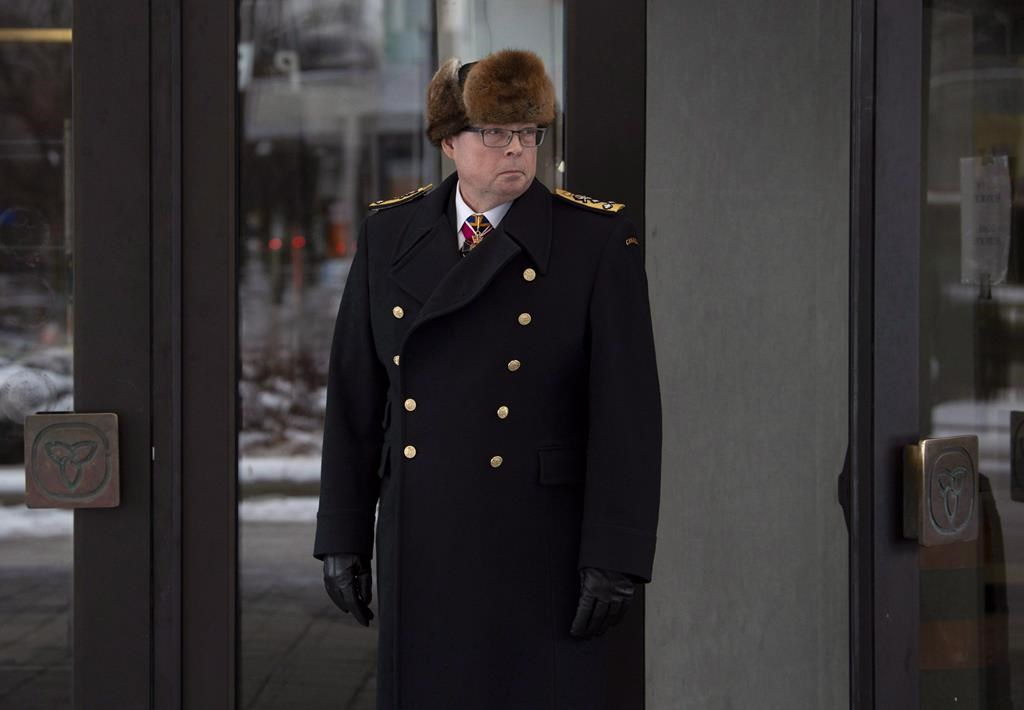Support strong Canadian climate journalism for 2025
Former prime minister Stephen Harper could be dragged into the criminal case against Vice-Admiral Mark Norman, as the suspended military officer's lawyers seek access to thousands of secret government documents.
Last month, Norman's lawyers gave the court a list of records they say are needed to ensure their client receives a fair trial, even as they accused the government of having "cherry-picked" the disclosure of information.
The Opposition Conservatives subsequently picked up on the demand for more information by repeatedly calling on Prime Minister Justin Trudeau to provide the documents, which government lawyers have said includes about 135,000 files.
But many of the records that Norman's lawyers requested — including many deemed cabinet secrets or "confidences" — were created while Harper was prime minister, and federal officials say he is the only one who can authorize their release.
In a document filed with the court, Paul Shuttle an adviser to the clerk of the Privy Council, the government's top bureaucrat, stated: "For documents from the Harper ministry, PM Harper would have to approve of their disclosure." The Privy Council Office reiterated that position in an email to The Canadian Press this week.
While the disclosure of evidence is a key tenet of Canada's legal system, and courts can normally compel the release of such information, the Canada Evidence Act lets the government refuse requests for cabinet confidences. Usually prepared for ministers to aid government deliberations and decision-making, documents marked as cabinet confidences hold closely guarded political secrets and are legally protected from unauthorized release.
Because of their extremely sensitive nature and the potential for using them as political weapons, cabinet confidences are not passed from one government to another. Rather, those produced by previous governments are held under lock and key by the clerk of the Privy Council.
"A government, by convention, can only authorize disclosure of its own cabinet confidences," said University of Ottawa professor Yan Campagnolo, who has studied the rules around cabinet secrecy.
"The current government does not have access to the cabinet confidences created under the previous government."
Officials would not say whether Harper had been asked to authorize the release of documents requested by Norman's lawyers. Repeated emails to one of the former prime minister's representatives were not answered.
Trudeau has sidestepped questions about whether he will approve the release of any cabinet confidences if the court determines they are relevant to Norman's case.
The issue will come up again next week when the Crown files a formal response to the request for documents from Norman's lawyers. Five days have been set aside starting Dec. 12 for the court to hear arguments about why the records are relevant.
Norman was charged in March with one count of breach of trust for allegedly leaking government secrets to Davie Shipyards after the Liberals decided to delay awarding the Quebec shipyard a $700-million contract.
The contract, which involved converting a civilian container ship into a temporary support vessel for the navy, was first negotiated by the Harper government but not finalized before the Liberals took office in October 2015.
The former navy commander and vice-chief of defence staff, who remains suspended with pay, has denied any wrongdoing and his trial is currently set to begin in August 2019 and run through much of next year's federal election.
The documents requested by Norman's lawyers include numerous records related to the Trudeau government's decision in November 2015 to delay the Davie contract, which the Liberals later decided to approve.
Norman's lawyers have also requested records of meetings, briefing notes and presentations prepared for cabinet while Harper's government was considering the project.
Campagnolo's research uncovered two instances where a government voluntarily released cabinet confidences for a criminal trial, both involving ministers accused of illegal activity. There have also been several inquiries where such records were released.
While such instances are rare, Campagnolo maintained the prime minister — Harper or Trudeau — should authorize the release of cabinet secrets if a judge determines they are relevant to Norman's case. Otherwise, he said, the charges should be dropped.
"If cabinet documents are relevant in the context of a criminal prosecution, they should be made available to the court and to the accused because there's a fundamental issue of liberty at stake," he said.
"It's about the innocence of an individual whose reputation may very well be destroyed or he may lose his liberty as a result of the process. In that context, the public interest requires that the documents be disclosed for the purpose of the prosecution to enable the court to find the truth."





Comments